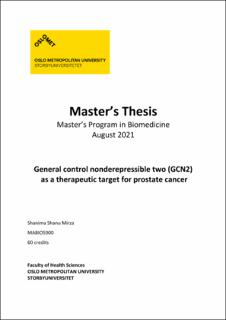| dc.contributor.advisor | Grallert, Beata | |
| dc.contributor.advisor | Urbanucci, Alfonso | |
| dc.contributor.advisor | Engedal, Nikolai | |
| dc.contributor.author | Mirza, Shanima Shanu | |
| dc.date.accessioned | 2024-03-18T12:09:24Z | |
| dc.date.available | 2024-03-18T12:09:24Z | |
| dc.date.issued | 2021-08 | |
| dc.identifier.uri | https://hdl.handle.net/11250/3122866 | |
| dc.description.abstract | Background: Prostate cancer (PC) is the second most common cancer in men worldwide. Primary PC is treated by surgery, radiotherapy or high dose-rate brachytherapy and androgen deprivation therapy (ADT) – and this is usually very effective initially. However, most of the PC patients relapse after ADT and progress to castration-resistant prostate cancer (CRPC), which is not curable. General control nonderepressible 2 (GCN2) is a protein kinase, best known for its important role in the response to nutritional changes such as shortage of amino acids and glucose, as well as in other stresses. Since cancer cells are often in a hostile microenvironment, the standing view is that GCN2 is important for cancer cells to survive and thrive. However, the importance of GCN2 in the context of PC has not been studied. Aim: This project aimed to explore the role and regulation of GCN2 in PC, as well as that of a known activator, GCN1, to address whether GCN2 might be an effective therapeutic target for the treatment of prostate cancer. Methods: Standard molecular biology methods were used to assess mRNA and protein levels such as RT-qPCR and immunoblotting, respectively. Appropriate PC cell lines were maintained in culture and treated as necessary to address the specific questions described in results. Cell viability assays were performed to determine the functional consequence of inhibiting GCN2 in PC cell lines. Results: We have shown that GCN2 is functional in PC-derived cell lines. We suggest that AR regulates GCN2 and GCN1 expression. Overexpressed MYC in PC seems to regulate GCN2, however not GCN1. Furthermore, we suggest that GCN2i decreases PC cell survival in an
androgen-dependent manner. Conclusion: Our findings suggest that GCN2 plays an important role in PC cells.
Furthermore, these findings lead us to speculate that GCN2 inhibition should be considered as a new therapeutic strategy for PC. | en_US |
| dc.description.abstract | Bakgrunn: Prostatakreft er den nest vanligste kreft hos menn over hele verden. Primær prostatakreft behandles med kirurgi, strålebehandling eller høy-doserate brachyterapi og kastrasjonsbehandling –og dette er vanligvis veldig effektivt i utgangspunktet. Imidlertid får de fleste prostatakreft pasientene tilbakefall etter kastrasjonsbehandling og framgang mot kastreringsresistent prostatakreft, noe som ikke er kurerbar. General control nonderepressible 2 (GCN2) er et protein kinase, best kjent for sin viktige rolle i respons til ernærings endringer som for eksempel mangel på aminosyrer og glukose, i tillegg til andre påkjenninger. Siden kreftceller ofte er i et fiendtlig mikromiljø, er den stående oppfatningen at GCN2 er viktig for at kreftceller skal overleve og trives. Imidlertid har betydningen av GCN2 i sammenheng med prostatakreft har ikke blitt studert.
Mål: Dette prosjektet hadde som mål å utforske rollen og reguleringen av GCN2 i prostatakreft, i tillegg til dens kjente aktivator, GCN1, for å ta for seg om GCN2 kan være et effektivt terapeutisk mål for behandling av prostatakreft. Metoder: Standard molekylærbiologiske metoder ble brukt for å vurdere mRNA og proteinnivåer, slik som henholdsvis RT-qPCR og immunoblotting. Passende prostatakreft cellelinjer ble opprettholdt i kultur og behandlet som nødvendig for å adressere de spesifikke spørsmålene beskrevet i resultater. Cellelevedyktighets analyser ble utført for å bestemme den funksjonelle konsekvensen av å hemme GCN2 i prostatakreft cellelinjer. Resultater: Vi har vist at GCN2 er funksjonell i prostatakreft cellelinjer. Vi foreslår at AR regulerer GCN2 og GCN1 uttrykk. Overuttrykt MYC i prostatakreft ser ut til å regulere GCN2, men ikke GCN1. Videre foreslår vi at hemming av GCN2 reduserer celleoverlevelsen til prostatakreft i en androgen avhengig måte. Konklusjon: Våres funn antyder at GCN2 spiller en viktig rolle i prostatakreft celler. Videre våres funn fører til å spekulere at hemming av GCN2 burde betraktes som en ny terapeutisk strategi for prostatakreft. | en_US |
| dc.language.iso | eng | en_US |
| dc.title | GCN2 as a therapeutic target for prostate cancer | en_US |
| dc.type | Master thesis | en_US |
| dc.description.version | publishedVersion | en_US |
